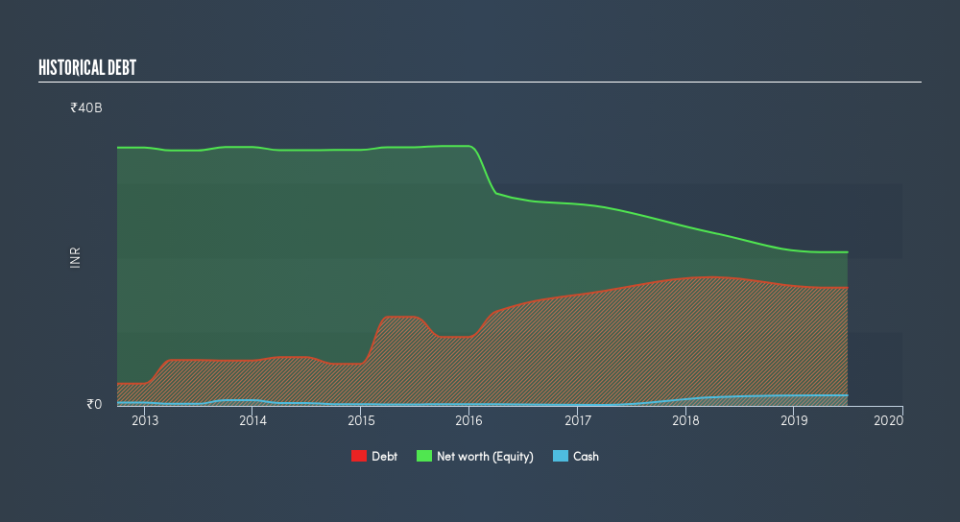D B Realty (NSE:DBREALTY) Has Debt But No Earnings; Should You Worry?

Legendary fund manager Li Lu (who Charlie Munger backed) once said, 'The biggest investment risk is not the volatility of prices, but whether you will suffer a permanent loss of capital.' So it might be obvious that you need to consider debt, when you think about how risky any given stock is, because too much debt can sink a company. Importantly, D B Realty Limited (NSE:DBREALTY) does carry debt. But is this debt a concern to shareholders?
When Is Debt A Problem?
Debt and other liabilities become risky for a business when it cannot easily fulfill those obligations, either with free cash flow or by raising capital at an attractive price. In the worst case scenario, a company can go bankrupt if it cannot pay its creditors. However, a more usual (but still expensive) situation is where a company must dilute shareholders at a cheap share price simply to get debt under control. Of course, plenty of companies use debt to fund growth, without any negative consequences. When we examine debt levels, we first consider both cash and debt levels, together.
View our latest analysis for D B Realty
How Much Debt Does D B Realty Carry?
The image below, which you can click on for greater detail, shows that D B Realty had debt of ₹16.0b at the end of March 2019, a reduction from ₹17.4b over a year. However, it also had ₹1.44b in cash, and so its net debt is ₹14.5b.
How Strong Is D B Realty's Balance Sheet?
The latest balance sheet data shows that D B Realty had liabilities of ₹34.5b due within a year, and liabilities of ₹14.4b falling due after that. Offsetting these obligations, it had cash of ₹1.44b as well as receivables valued at ₹9.55b due within 12 months. So its liabilities outweigh the sum of its cash and (near-term) receivables by ₹37.9b.
This deficit casts a shadow over the ₹1.58b company, like a colossus towering over mere mortals. So we'd watch its balance sheet closely, without a doubt After all, D B Realty would likely require a major re-capitalisation if it had to pay its creditors today. When analysing debt levels, the balance sheet is the obvious place to start. But it is D B Realty's earnings that will influence how the balance sheet holds up in the future. So when considering debt, it's definitely worth looking at the earnings trend. Click here for an interactive snapshot.
Over 12 months, D B Realty reported revenue of ₹3.4b, which is a gain of 88%. With any luck the company will be able to grow its way to profitability.
Caveat Emptor
While we can certainly savour D B Realty's tasty revenue growth, its negative earnings before interest and tax (EBIT) leaves a bitter aftertaste. Indeed, it lost ₹125m at the EBIT level. Reflecting on this and the significant total liabilities, it's hard to know what to say about the stock because of our intense dis-affinity for it. Like every long-shot we're sure it has a glossy presentation outlining its blue-sky potential. But the fact is that it incinerated ₹386m of cash in the last twelve months, and has precious few liquid assets in comparison to its liabilities. So is this a high risk stock? We think so, and we'd avoid it like an anti-vaccine zealot with an obvious case of measles. For riskier companies like D B Realty I always like to keep an eye on the long term profit and revenue trends. Fortunately, you can click to see our interactive graph of its profit, revenue, and operating cashflow.
If, after all that, you're more interested in a fast growing company with a rock-solid balance sheet, then check out our list of net cash growth stocks without delay.
We aim to bring you long-term focused research analysis driven by fundamental data. Note that our analysis may not factor in the latest price-sensitive company announcements or qualitative material.
If you spot an error that warrants correction, please contact the editor at editorial-team@simplywallst.com. This article by Simply Wall St is general in nature. It does not constitute a recommendation to buy or sell any stock, and does not take account of your objectives, or your financial situation. Simply Wall St has no position in the stocks mentioned. Thank you for reading.

 generic
generic 
